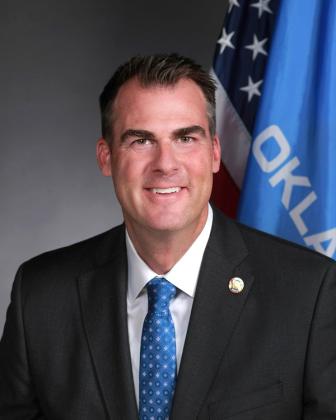OKLAHOMA CITY — The three-way range war between the Republican leaders in the Oklahoma Legislature and Governor Kevin Stitt’s office hit a milestone last week, with the governor vetoing 20 pieces of legislation and the Senate pushing back by shooting down two the governor’s executive nominations.
Stitt’s vetoes included bills that allowed college athletes to be paid for the commercial use of their name, image or likeness and a proposal that authorized protective orders in certain child abuse cases.
Stitt returned the fire, vetoing a bill that authorized the Oklahoma Educational Television Authority. Stitt told the media that he vetoed the bill because it was outdated for the state to fund the OETA. He also accused the station of broadcasting programing that indoctrinated kids.
“Some of the stuff that they’re showing just openly sexualizes our kids,” the governor said.
The feud has raised the tension level in this year’s budget negotiations. While budget negotiations between the Legislature and the governor are normally spirited, this year’s effort has been unusually tense.
After the governor’s veto, Senate Pro Tempore Greg Treat (R-Oklahoma City) said he was appalled. Treat said the Senate would not give in to pettiness and bullying.
Stitt’s veto message threatened to “veto any and all legislation authored by senators who have not stood with the people of Oklahoma and supported this plan.”
Still said he could not allow another year to go by without cutting taxes and reforming education. The governor continues to push lawmakers to endorse this education plan – which he considered a compromise between proposals in the House and Senate.
Treat heard harsh words for the governor. “I think it’s beneath the dignity of that office to issue the types of vetoes he did,” the Senate pro tempore said.
The big sticking point centers on education policy, funding and a string of tax cuts.
Late Friday Stitt said he was optimistic that a deal could be made. He said the Senate’s latest education plan had restarted negotiation on teacher pay raises, funding for public schools and tax credits for Oklahomans who send their kids to private schools or educate them at home.
Earlier last week the Senate cleared a bill that would increase the pay of state teachers who have five years or less experience by $4,000. Teachers with six to ten years’ experience would see an increase of $5,000. For teachers with more than two decades’ worth of experience the increase would jump to $8,000.
The bill also would increase the pay of certified and support staff in public school and CareerTech centers with a one-time $3,000 stipend. The plan would add $150 million to the education funding formula and eliminate a $2 million cap on how much each school district could receive. Some lawmakers had complained that the cap benefited rural schools over the larger urban districts.
In addition to the pay increases and addition money in the funding formula, the Senate’s package sets additional income controls for the education tax credits. Those families who earn under $75,000 would quality for a $7,500 tax credit for each child attending a private school.
That credit decreases as family income increases. For families with an income between $150,000 and $225,000, the credit drops to $6,6000 and for those making over $250,000 the credit drops to $5,000. Families who homeschool their children would receive a $1,000 tax credit per student.
Treat said the Senate supported Stitt’s call for choice. “We just delivered an excellent school choice plan,” the Senate leader said. “We just delivered the pay raise he references here, but we did it in a manner that sought input from across the state, not just from advisers.”



